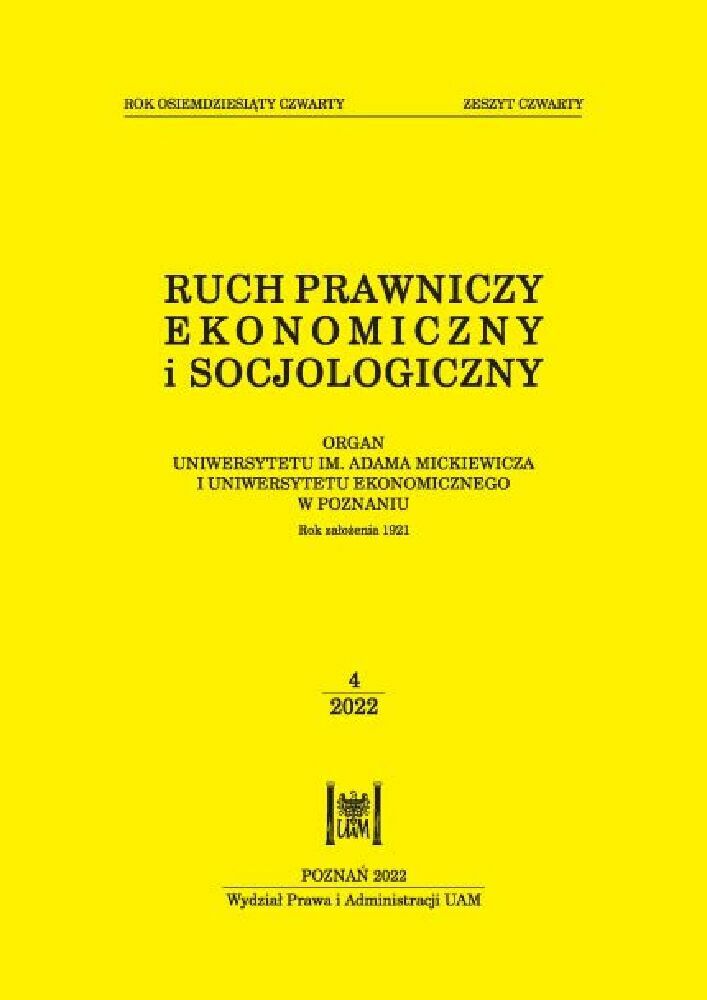Abstract
In the article, I try to answer the question of whether Durkheimian utilitarianism, reconstructed on the basis of Jonathan Haidt’s idea, can justify the enforcement of morality by criminal law (i.e. whether it is an adequate theory of legal moralism). In the first part, I present what Durkheimian utilitarianism is and what its theses are, and in the second, using the interpretative key that Herbert Hart used in the debate with Patrick Devlin, I explain what moralistic position it is actually defending. Ultimately, I come to the conclusion that the main thesis of Durkheimian utilitarianism is the Hartian thesis on disintegration. However, the lack of an adequate empirical justification raises doubts as to whether it can constitute a satisfactory theory of the moral justification of criminalization.
Funding
National Science Centre (Poland)
References
Bassham, G. (2012). Legislating morality: scoring the Hart-Devlin debate after fifty years. Ratio Juris 25(2): 117-132. https://doi.org/10.1111/j.1467-9337.2012.00506.x DOI: https://doi.org/10.1111/j.1467-9337.2012.00506.x
Cane, P. (2006). Taking law seriously: starting points of the Hart/Devlin debate. The Journal of Ethics 10(1/2): 21-51. https://doi.org/10.1007/s10892-005-4590-x DOI: https://doi.org/10.1007/s10892-005-4590-x
Devlin, P. (1965). The Enforcement of Morals. Oxford: Oxford University Press.
Duff, R.A. (2014). Towards a modest legal moralism. Criminal Law and Philosophy 8(1): 217-235https://doi.org/10.1007/s11572-012-9191-8 DOI: https://doi.org/10.1007/s11572-012-9191-8
Dworkin, R. (1966). Lord Devlin and the enforcement of morals. The Yale Law Journal 75(6): 986-1005. https://doi.org/10.2307/794893 DOI: https://doi.org/10.2307/794893
Feinberg, J. (1990). Harmless Wrongdoing. Vol. 4. Oxford: Oxford University Press.
Fletcher, G. (2013). A fresh start for the objective-list theory of well-being. Utilitas 25(2): 206-220. https://doi.org/10.1017/S0953820812000453 DOI: https://doi.org/10.1017/S0953820812000453
George, R.P. (1995). Making Men Moral: Civil Liberties and Public Morality. Oxford: Clarendon Press. https://doi.org/10.1093/acprof:oso/9780198260240.001.0001 DOI: https://doi.org/10.1093/acprof:oso/9780198260240.001.0001
Glanc-Żabiełowicz, M. (2021). Debata Hart-Devlin. Studium z filozofii prawa. Gdańsk: Wydawnictwo Uniwersytetu Gdańskiego.
Graham, J., Haidt, J., Koleva, S., Motyl, M., Iyer, R., Wojcik, S.P., Ditto, P.H. (2013). Moral foundations theory: the pragmatic validity of moral pluralism, [w:] P. Devine, A. Plant (eds.), Advances in Experimental Social Psychology (55-130). Vol. 47. San Diego: Academic Press. https://doi.org/10.1016/B978-0-12-407236-7.00002-4 DOI: https://doi.org/10.1016/B978-0-12-407236-7.00002-4
Haidt, J. (2013). Prawy umysł. Dlaczego dobrych ludzi dzieli religia i polityka. Tłum. A. Nowak-Młynikowska. Sopot: Smak Słowa.
Haidt, J. (2014). Why I think Sam Harris is wrong about morality. [Online]: <https://righteousmind.com/why-i-think-sam-harris-is-wrong-about-morality> [dostęp: 30.12.2021].
Haidt, J., Graham, J. (2009). Planet of the Durkheimians, where community, authority, and sacredness are foundations of morality. [w:] J.T. Jost, A.C. Kay, H. Thorisdottir (eds.), Social and Psychological Bases of Ideology and System Justification (371-401). Oxford: Oxford University Press. https://doi.org/10.1093/acprof:oso/9780195320916.003.015 DOI: https://doi.org/10.1093/acprof:oso/9780195320916.003.015
Harris, S. (2012). Pejzaż moralny. W jaki sposób nauka może określać wartości. Tłum. P. Szwajcer. Warszawa: Wydawnictwo Stare Groszki.
Hart, H.L. (1967). Social solidarity and the enforcement of morality. The University of Chicago Law Review 35(1): 1-13. https://doi.org/10.2307/1598946 DOI: https://doi.org/10.2307/1598946
Hart, H.L.A. (1963). Law, Liberty, and Morality. Stanford: Stanford University Press. https://doi.org/10.1515/9781503620612 DOI: https://doi.org/10.1515/9781503620612
Hart, H.L.A. (1968). Punishment and Responsibility: Essays in the Philosophy of Law. Oxford: Oxford University Press.
Hart, H.L.A. (1983). Essays in Jurisprudence and Philosophy. Oxford: Oxford University Press. https://doi.org/10.1093/acprof:oso/9780198253884.001.0001 DOI: https://doi.org/10.1093/acprof:oso/9780198253884.001.0001
Hooker, B. (2002). Ideal Code, Real World: A Rule-Consequentialist Theory of Morality. Oxford: Oxford University Press. https://doi.org/10.1093/0199256578.001.0001 DOI: https://doi.org/10.1093/0199256578.001.0001
Hurka, T. (1996). Perfectionism. Oxford: Oxford University Press. https://doi.org/10.1093/0195101162.001.0001 DOI: https://doi.org/10.1093/0195101162.001.0001
Juzaszek, M. (2022). Haidt's Durkheimian Utilitarianism - a Charitable Interpretation. Philosophia. <https://link.springer.com/article/10.1007/s11406-022-00570-4> [dostęp: 20.12.2022]. https://doi.org/10.1007/s11406-022-00570-4 DOI: https://doi.org/10.1007/s11406-022-00570-4
Juzaszek, M. (2023). Durkheimian utilitarianism and legal moralism. Revus 49. <https://journals.openedition.org/revus/8652> [dostęp: 20.12.2022]. https://doi.org/10.4000/revus.8652 DOI: https://doi.org/10.4000/revus.8652
Kekes, J. (1998). A Case for Conservatism. Ithaca: Cornell University Press.
Kekes, J. (2000). The enforcement of morality. American Philosophical Quarterly 37(1): 23-35.
Kluver, J., Frazier, R., Haidt, J. (2014). Behavioral ethics for Homo economicus, Homo heuristicus, and Homo duplex. Organizational Behavior and Human Decision Processes 123(2): 150-158. https://doi.org/10.1016/j.obhdp.2013.12.004 DOI: https://doi.org/10.1016/j.obhdp.2013.12.004
Lukes, S., Prabhat, D. (2012). Durkheim on law and morality: the disintegration thesis. Journal of Classical Sociology 12(3/4): 363-383. https://doi.org/10.1177/1468795X12453270 DOI: https://doi.org/10.1177/1468795X12453270
Mitchell, B. (1967). Law, Morality and Religion in a Secular Society. Oxford: Oxford University Press.
Moore, M.S. (2010). Placing Blame: A Theory of the Criminal Law. New York: Oxford University Press. https://doi.org/10.1093/acprof:oso/9780199599493.001.0001 DOI: https://doi.org/10.1093/acprof:oso/9780199599493.001.0001
Rice, C.M. (2013). Defending the objective list theory of well-being. Ratio 26(2): 196-211. https://doi.org/10.1111/rati.12007 DOI: https://doi.org/10.1111/rati.12007
Ripstein, A. (2007). Legal moralism and the harm principle: a rejoinder. Philosophy & Public Affairs 35(2): 195-201. https://doi.org/10.1111/j.1088-4963.2007.00107.x DOI: https://doi.org/10.1111/j.1088-4963.2007.00107.x
Saja, K. (2015). Etyka normatywna. Między konsekwencjalizmem a deontologią. Kraków: Universitas.
Saja, K. (2019a). The Functional Model of Analysis as Middle Ground Meta-Ethics. Diametros 17(63): 69-89. https://doi.org/10.33392/diam.1296 DOI: https://doi.org/10.33392/diam.1296
Saja, K. (2019b). Institutional function consequentialism. Analiza i Egzystencja 48: 5-25. https://doi.org/10.18276/aie.2019.48-01 DOI: https://doi.org/10.18276/aie.2019.48-01
Sinnott-Armstrong, W. (2021). Consequentialism, [w:] E.N. Zalta (ed.), The Stanford Encyclopedia of Philosophy (Fall 2021 Edition). <https://plato.stanford.edu/archives/fall2021/entries/consequentialism/> [dostęp: 20.12.2022].
Van der Burg, W. (1999). Two models of law and morality. Associations: Journal for Social and Legal Theory 3(1): 61-82.
Wallin, A.E. (2012). John Finnis's natural law theory and a critique of the incommensurable nature of basic goods. Campbell Law Review 35(1): 59-81.
Wolfenden Report (1957). Report of the Committee on Homosexual Offences and Prostitution.
License
Copyright (c) 2022 WPiA UAM

This work is licensed under a Creative Commons Attribution-NonCommercial-NoDerivatives 4.0 International License.





